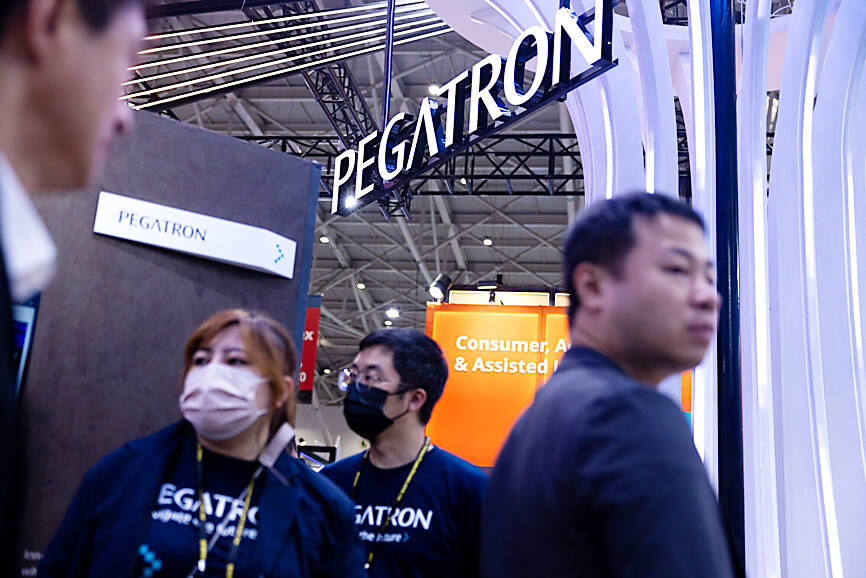Pegatron Corp (和碩), a key assembler of Apple Inc’s iPhones, expressed optimism on Friday that the traditional peak season in the second half of the year would drive revenue growth and help its overall operations outperform the first half.
“Revenue in the second half of the year is expected to surpass that in the first half, as the period typically marks the industry’s peak season,” a Pegatron official told the Taipei Times by telephone on Friday, after the company reported first-half revenue of NT$539.76 billion (US$18.48 billion), up 7.07 percent from the same period last year.
The company said it would continue to closely monitor developments related to US tariffs and foreign exchange fluctuations, while pressing forward with overseas capacity expansion.

Photo: Annabelle Chih, Bloomberg
The company established a manufacturing facility in Mexico last year, with mass production of servers at the site expected to begin in the third quarter, said the official, who declined to be named.
Pegatron had previously disclosed collaboration with a leading US electric vehicle (EV) maker, and the official added that the company also plans to launch new products with two other automakers from the US, Japan or Europe, with mass production expected to begin by the end of this year, the official said.
The company on Thursday posted revenue of NT$78.77 billion for last month, up 11.05 percent year-on-year, but down 8.07 percent from a month earlier.
Second-quarter revenue totaled NT$267.33 billion, rising 5.37 percent compared with the same period last year, but slipping 1.87 percent from the previous quarter, the company said.
While the front-loading of orders ahead of US President Donald Trump’s planned tariffs on Taiwanese goods boosted the company’s sales in the second quarter, the sharp appreciation of the New Taiwan dollar against the US dollar weighed on revenue, the official said, without disclosing the exact figure of foreign-exchange losses.
Pegatron shipped 990,000 notebook computers last month, up 27.74 percent from the previous month, the company said.
Total notebook shipments in the second quarter reached 2.37 million units, up 25.39 percent quarter-on-quarter and 18.5 percent year-on-year, surpassing the company’s earlier forecast of low-teens growth, it said.
The front-loading effect was particularly strong for its notebook shipments in the second quarter, the official said.
However, the outlook for third-quarter notebook shipments remains unclear, as most clients are adopting a wait-and-see approach on tariffs, the official added.
Server shipments also performed better in the second quarter than in the first quarter, the official said.
The company last month said that it expected server shipments in the second half of the year to outpace those in the first half.
As Pegatron’s artificial intelligence servers have completed product verification by a mid-sized US cloud service provider and are expected to begin shipments in the second half, it would benefit the company’s third-quarter revenue growth, Yuanta Securities Investment Consulting Co (元大投顧) said in a note on Friday.
However, the potential absence of another wave of front-loaded notebook orders and growing competition from Chinese smartphone brands could weigh on Pegatron’s business, Yuanta said.

Taiwan’s long-term economic competitiveness will hinge not only on national champions like Taiwan Semiconductor Manufacturing Co. (TSMC, 台積電) but also on the widespread adoption of artificial intelligence (AI) and other emerging technologies, a US-based scholar has said. At a lecture in Taipei on Tuesday, Jeffrey Ding, assistant professor of political science at the George Washington University and author of "Technology and the Rise of Great Powers," argued that historical experience shows that general-purpose technologies (GPTs) — such as electricity, computers and now AI — shape long-term economic advantages through their diffusion across the broader economy. "What really matters is not who pioneers

In a high-security Shenzhen laboratory, Chinese scientists have built what Washington has spent years trying to prevent: a prototype of a machine capable of producing the cutting-edge semiconductor chips that power artificial intelligence (AI), smartphones and weapons central to Western military dominance, Reuters has learned. Completed early this year and undergoing testing, the prototype fills nearly an entire factory floor. It was built by a team of former engineers from Dutch semiconductor giant ASML who reverse-engineered the company’s extreme ultraviolet lithography (EUV) machines, according to two people with knowledge of the project. EUV machines sit at the heart of a technological Cold

TAIWAN VALUE CHAIN: Foxtron is to fully own Luxgen following the transaction and it plans to launch a new electric model, the Foxtron Bria, in Taiwan next year Yulon Motor Co (裕隆汽車) yesterday said that its board of directors approved the disposal of its electric vehicle (EV) unit, Luxgen Motor Co (納智捷汽車), to Foxtron Vehicle Technologies Co (鴻華先進) for NT$787.6 million (US$24.98 million). Foxtron, a half-half joint venture between Yulon affiliate Hua-Chuang Automobile Information Technical Center Co (華創車電) and Hon Hai Precision Industry Co (鴻海精密), expects to wrap up the deal in the first quarter of next year. Foxtron would fully own Luxgen following the transaction, including five car distributing companies, outlets and all employees. The deal is subject to the approval of the Fair Trade Commission, Foxtron said. “Foxtron will be

INFLATION CONSIDERATION: The BOJ governor said that it would ‘keep making appropriate decisions’ and would adjust depending on the economy and prices The Bank of Japan (BOJ) yesterday raised its benchmark interest rate to the highest in 30 years and said more increases are in the pipeline if conditions allow, in a sign of growing conviction that it can attain the stable inflation target it has pursued for more than a decade. Bank of Japan Governor Kazuo Ueda’s policy board increased the rate by 0.2 percentage points to 0.75 percent, in a unanimous decision, the bank said in a statement. The central bank cited the rising likelihood of its economic outlook being realized. The rate change was expected by all 50 economists surveyed by Bloomberg. The